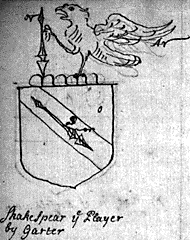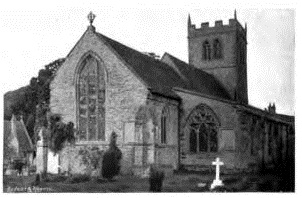Shakespeare's Parents
Shakespeare's father, John, came to Stratford from Snitterfield before 1532 as an apprentice glover and tanner of leathers. John Shakespeare prospered and began to deal in farm products and wool. It is recorded that he bought a house in 1552 (the date that he first appears in the town records), and bought more property in 1556. Because John Shakespeare owned one house on Greenhill Street and two houses on Henley Street, the exact location of William's birth cannot be known for certain. Sometime between 1556 and 1558 John Shakespeare married Mary Arden, the daughter of the wealthy Robert Arden of Wilmecote and owner of the sixty-acre farm called Asbies. The wedding would have most likely taken place in Mary Arden's parish church at Aston Cantlow, the burial place of Robert Arden, and, although there is no evidence of strong piety on either side of the family, it would have been a Catholic service, since Queen Mary I was the reigning monarch.
We assume neither John nor Mary could write -- John used a pair of glovers' compasses as his signature while Mary used a running horse -- but it did not prevent them from becoming important members of the community.  John Shakespeare was elected to a multitude of civic positions, including ale-taster of the borough (Stratford had a long-reaching reputation for its brewing) in 1557, chamberlain of the borough in 1561, alderman in 1565, (a position which came with free education for his children at the Stratford Grammar School), high bailiff, or mayor, in 1568, and chief alderman in 1571.
Due to his important civic duties, he rightfully sought the title of gentleman and applied for his coat-of-arms in 1570 (see picture on left). However, for unspecific reasons the application was abruptly withdrawn, and within the next few years, for reasons just as mystifying, John Shakespeare would go from wealthy business owner and dedicated civil servant to debtor and absentee council member. John Shakespeare was elected to a multitude of civic positions, including ale-taster of the borough (Stratford had a long-reaching reputation for its brewing) in 1557, chamberlain of the borough in 1561, alderman in 1565, (a position which came with free education for his children at the Stratford Grammar School), high bailiff, or mayor, in 1568, and chief alderman in 1571.
Due to his important civic duties, he rightfully sought the title of gentleman and applied for his coat-of-arms in 1570 (see picture on left). However, for unspecific reasons the application was abruptly withdrawn, and within the next few years, for reasons just as mystifying, John Shakespeare would go from wealthy business owner and dedicated civil servant to debtor and absentee council member.
By 1578 he was behind in his taxes and stopped paying the statutory aldermanic subscription for poor relief. In 1579, he had to mortgage Mary Shakespeare's estate, Asbies, to pay his creditors. In 1580 he was fined 40 pounds for missing a court date and in 1586 the town removed him from the board of aldermen due to lack of attendance. By 1590, John Shakespeare owned only his house on Henley Street and, in 1592 he was fined for not attending church.
However, near the very
end of John Shakespeare's life, it seems that his
social and economic standing was again beginning to
flourish. He once again applied to the College of
Heralds for a coat-of-arms in 1596, and, due likely to the success of William in London, this time his
wish was granted. On October 20 of that year, by
permission of the Garter King of Arms (the Queen's aid
in such matters) "the said John Shakespeare,
Gentlemen, and...his children, issue and posterity" were
lawfully entitled to display the gold coat-of-arms,
with a black banner bearing a silver spear (a visual
representation of the family name "Shakespeare"). The
coat-of-arms could then be displayed on their door and all their personal items.
The motto was Non sanz droict or not without
right. The reason cited for granting the
coat-of-arms was John Shakespeare's grandfather's faithful service
to Henry VII, but no specifics were given as to what
service he actually performed. The coat-of-arms
appears on Shakespeare's tomb in Stratford.
In 1599 John Shakespeare was reinstated on the town council, but died a short time later, in 1601. He was probably near seventy years old and he had been married for forty-four years. Mary Shakespeare died in 1608 and was buried on September 9.
How to cite this article:
Mabillard, Amanda. Shakespeare of Stratford: Shakespeare's Parents. Shakespeare Online. 18 Sept. 2000. < http://www.shakespeare-online.com/biography/shakespeareparents.html >.
References
Rowse, A.L. Shakespeare the Man. London: Macmillan, 1973.
Speaight, Robert. Shakespeare: The Man and his Achievement. New York: Stein and Day, 1977.
______________
More Resources
 Queen Elizabeth: Shakespeare's Patron Queen Elizabeth: Shakespeare's Patron
 King James I of England: Shakespeare's Patron King James I of England: Shakespeare's Patron
 The Earl of Southampton: Shakespeare's Patron The Earl of Southampton: Shakespeare's Patron
 Going to a Play in Elizabethan London Going to a Play in Elizabethan London
 The Shakespeare Sisterhood - A Gallery The Shakespeare Sisterhood - A Gallery
 Worst Diseases in Shakespeare's London Worst Diseases in Shakespeare's London
 Preface to The First Folio Preface to The First Folio
 Shakespeare's Pathos - General Introduction Shakespeare's Pathos - General Introduction
 Shakespeare's Portrayal of Childhood Shakespeare's Portrayal of Childhood
 Shakespeare's Portrayal of Old Age Shakespeare's Portrayal of Old Age
 Shakespeare's Attention to Details Shakespeare's Attention to Details
 Shakespeare's Portrayals of Sleep Shakespeare's Portrayals of Sleep
 Publishing in Elizabethan England Publishing in Elizabethan England
 What did Shakespeare drink? What did Shakespeare drink?
 Ben Jonson and the Decline of the Drama Ben Jonson and the Decline of the Drama
 Publishing in Elizabethan England Publishing in Elizabethan England
 Alchemy and Astrology in Shakespeare's Day Alchemy and Astrology in Shakespeare's Day
 Entertainment in Elizabethan England Entertainment in Elizabethan England
 London's First Public Playhouse London's First Public Playhouse
 Shakespeare Hits the Big Time Shakespeare Hits the Big Time
|

More to Explore
 Shakespeare's Ancestry Shakespeare's Ancestry
 Shakespeare's Birth Shakespeare's Birth
 Shakespeare's Siblings Shakespeare's Siblings
 Shakespeare's Education Shakespeare's Education
 Shakespeare as Actor Shakespeare as Actor
 Shakespeare's Lost Years Shakespeare's Lost Years
 Shakespeare's Marriage Shakespeare's Marriage
 Shakespeare's Children Shakespeare's Children
 Shakespeare's Death Shakespeare's Death
 Shakespeare's Burial Shakespeare's Burial
_____
|
Did You Know? ... The Elizabethans cared as little for spelling as they did for the Spanish and nowhere is their comical disregard for simple consistency more evident than in their treatment of the surname Shakespeare. The misspellings were most egregious before Shakespeare's birth and during his youth, with colorfully bizarre variations found in registers and other legal documents of the time. Read on...
|
_____
 Was Shakespeare Italian? Was Shakespeare Italian?
 How Many Plays Did Shakespeare Write? How Many Plays Did Shakespeare Write?
 What Did Shakespeare Look Like? What Did Shakespeare Look Like?
 Shakespeare's Religion Shakespeare's Religion
 Shakespeare's Contemporaries: Top Five Greatest Shakespeare's Contemporaries: Top Five Greatest
 Shakespeare's Audience: The Groundlings Shakespeare's Audience: The Groundlings
 Four Periods of Shakespeare's Life Four Periods of Shakespeare's Life
 Shakespeare's Language Shakespeare's Language
 Words Shakespeare Invented Words Shakespeare Invented
 Shakespeare's Reputation in Elizabethan England Shakespeare's Reputation in Elizabethan England
 Shakespeare at the Globe Shakespeare at the Globe
 Shakespeare's Impact on Other Writers Shakespeare's Impact on Other Writers
 Quotations About William Shakespeare Quotations About William Shakespeare
 Shakespeare's Boss: The Master of Revels Shakespeare's Boss: The Master of Revels
 Daily Life in Shakespeare's London Daily Life in Shakespeare's London
 Life in Stratford (structures and guilds) Life in Stratford (structures and guilds)
 Life in Stratford (trades, laws, furniture, hygiene) Life in Stratford (trades, laws, furniture, hygiene)
 Stratford School Days: What Did Shakespeare Read? Stratford School Days: What Did Shakespeare Read?
 Games in Shakespeare's England [A-L] Games in Shakespeare's England [A-L]
 Games in Shakespeare's England [M-Z] Games in Shakespeare's England [M-Z]
 An Elizabethan Christmas An Elizabethan Christmas
 Clothing in Elizabethan England Clothing in Elizabethan England
|

 John Shakespeare was elected to a multitude of civic positions, including
John Shakespeare was elected to a multitude of civic positions, including